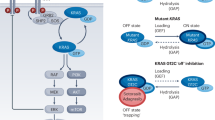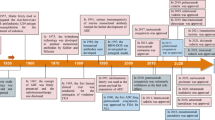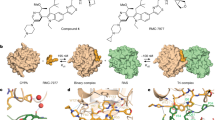Abstract
Aurora kinases are a family of protein kinases that have a key role in multiple stages of mitosis. Over-expression of Aurora kinases, particularly Aurora A, has been demonstrated in a number of solid tumors and hematological malignancies. Not surprisingly, these serine/threonine kinases have become attractive small molecule targets for cancer therapeutics, with several inhibitors currently in early-phase clinical trials. A small number of compounds developed to date are highly selective for either Aurora A or Aurora B, while the majority inhibit both Aurora A and Aurora B; many of these compounds exhibit ‘off-target’ inhibition of kinases such as ABL, JAK2 and FLT3. It is currently unclear whether the therapeutic activity of these compounds in leukemia is primarily due to selective Aurora or multi-kinase inhibition. The most promising application for Aurora kinase inhibitors to date appears to be in FLT3-mutated acute myeloid leukemia (AML) and imatinib-resistant chronic myeloid leukemia/Philadelphia chromosome-positive (Ph+) acute lymphoblastic leukemia, particularly when caused by the T315I mutation. Here we review the growing body of evidence supporting the use of Aurora kinase inhibitors as effective agents for AML and Ph+ leukemias.
This is a preview of subscription content, access via your institution
Access options
Subscribe to this journal
Receive 12 print issues and online access
$259.00 per year
only $21.58 per issue
Buy this article
- Purchase on Springer Link
- Instant access to full article PDF
Prices may be subject to local taxes which are calculated during checkout

Similar content being viewed by others
References
Carmena M, Earnshaw WC . The cellular geography of aurora kinases. Nat Rev Mol Cell Biol 2003; 4: 842–854.
Girdler F, Gascoigne KE, Eyers PA, Hartmuth S, Crafter C, Foote KM et al. Validating Aurora B as an anti-cancer drug target. J Cell Sci 2006; 119 (Part 17): 3664–3675.
Carpinelli P, Moll J . Aurora kinase inhibitors: identification and preclinical validation of their biomarkers. Expert Opin Ther Targets 2008; 12: 69–80.
Vader G, Medema RH, Lens SM . The chromosomal passenger complex: guiding Aurora-B through mitosis. J Cell Biol 2006; 173: 833–837.
Gautschi O, Heighway J, Mack PC, Purnell PR, Lara Jr PN, Gandara DR . Aurora kinases as anticancer drug targets. Clin Cancer Res 2008; 14: 1639–1648.
Kobayashi M, Nakamura S, Ono T, Sugimoto Y, Sahara N, Shinjo K et al. Analysis of Aurora kinase expressions and cell cycle regulation by Aurora-C in leukemia cells. Blood (ASH Annu Meet Abstr) 2006; 108: Abstract 1366.
Ewart-Toland A, Briassouli P, de Koning JP, Mao JH, Yuan J, Chan F et al. Identification of Stk6/STK15 as a candidate low-penetrance tumor-susceptibility gene in mouse and human. Nat Genet 2003; 34: 403–412.
Ikezoe T, Yang J, Nishioka C, Tasaka T, Taniguchi A, Kuwayama Y et al. A novel treatment strategy targeting Aurora kinases in acute myelogenous leukemia. Mol Cancer Ther 2007; 6: 1851–1857.
Ochi T, Fujiwara H, Suemori K, Azuma T, Yakushijin Y, Hato T et al. Aurora-A kinase: a novel target of cellular immunotherapy for leukemia. Blood 2009; 113: 66–74.
Huang XF, Luo SK, Xu J, Li J, Xu DR, Wang LH et al. Aurora kinase inhibitory VX-680 increases Bax/Bcl-2 ratio and induces apoptosis in Aurora-A-high acute myeloid leukemia. Blood 2008; 111: 2854–2865.
Walsby E, Walsh V, Pepper C, Burnett A, Mills K . Effects of the aurora kinase inhibitors AZD1152-HQPA and ZM447439 on growth arrest and polyploidy in acute myeloid leukemia cell lines and primary blasts. Haematologica 2008; 93: 662–669.
Bischoff JR, Anderson L, Zhu Y, Mossie K, Ng L, Souza B et al. A homologue of Drosophila aurora kinase is oncogenic and amplified in human colorectal cancers. EMBO J 1998; 17: 3052–3065.
Carvajal RD, Tse A, Schwartz GK . Aurora kinases: new targets for cancer therapy. Clin Cancer Res 2006; 12: 6869–6875.
Schindler T, Bornmann W, Pellicena P, Miller WT, Clarkson B, Kuriyan J . Structural mechanism for STI-571 inhibition of Abelson tyrosine kinase. Science 2000; 289: 1938–1942.
Quintas-Cardama A, Kantarjian H, Cortes J . Flying under the radar: the new wave of BCR-ABL inhibitors. Nat Rev Drug Discov 2007; 6: 834–848.
Soverini S, Colarossi S, Gnani A, Rosti G, Castagnetti F, Poerio A et al. Contribution of ABL kinase domain mutations to imatinib resistance in different subsets of Philadelphia-positive patients: by the GIMEMA Working Party on Chronic Myeloid Leukemia. Clin Cancer Res 2006; 12: 7374–7379.
Nicolini FE, Mauro MJ, Martinelli G, Kim DW, Soverini S, Muller MC et al. Epidemiological study on survival of chronic myeloid leukemia (CML) and Ph+ acute lymphoblastic leukemia (ALL) patients with BCR-ABL T315I mutation. Blood 2009; 114: 5271–5278.
Giles FJ, Cortes J, Jones D, Bergstrom D, Kantarjian H, Freedman SJ . MK-0457, a novel kinase inhibitor, is active in patients with chronic myeloid leukemia or acute lymphocytic leukemia with the T315I BCR-ABL mutation. Blood 2007; 109: 500–502.
Rhodes J, York RD, Tara D, Tajinda K, Druker BJ . CrkL functions as a nuclear adaptor and transcriptional activator in Bcr-Abl-expressing cells. Exp Hematol 2000; 28: 305–310.
Vertex Pharmaceuticals. Vertex's collaborator Merck suspends patient enrollment in clinical trials of MK-0457 (VX-680) pending full analysis of clinical data. 2007 [cited 2009 December 9]. Available from http://investors.vrtx.com/releaseDetail.cfm?releaseid=276543.
US National Institutes of Health. ClinicalTrials.gov. 2009 [cited 2009 December 8]. Available from clinicaltrials.gov.
Foran JM, Ravandi F, O'Brien SM, Borthakur G, Rios M, Boone P et al. Phase I and pharmacodynamic trial of AT9283, an aurora kinase inhibitor, in patients with refractory leukemia. ASCO Meet Abstr 2008; 26 (15_suppl): 2518.
Verstovsek S . Therapeutic potential of JAK2 inhibitors. Hematol Am Soc Hematol Educ Program 2009, 636–642.
Zhou J, Bi C, Janakakumara JV, Liu SC, Chng WJ, Tay KG et al. Enhanced activation of STAT pathways and overexpression of survivin confer resistance to FLT3 inhibitors and could be therapeutic targets in AML. Blood 2009; 113: 4052–4062.
Tanaka R, Squires MS, Kimura S, Yokota A, Mallett K, Smyth T et al. Activity of the multi-targeted kinase inhibitor, AT9283 on imatinib-resistant CML models. Blood (ASH Annu Meet Abstr) 2008; 112: Abstract 1104.
Cortes-Franco J, Dombret H, Schafhausen P, Brummendorf TH, Boissel N, Latini F et al. Danusertib hydrochloride (PHA-739358), a multi-kinase Aurora inhibitor, elicits clinical benefit in advanced chronic myeloid leukemia and Philadelphia chromosome positive acute lymphoblastic leukemia. Blood (ASH Annu Meet Abstr) 2009 114: Abstract 864.
Cortes J, Paquette R, Talpaz M, Pinilla J, Asatiani E, Wetzler M et al. Preliminary clinical activity in a phase I trial of the BCR-ABL/IGF-1R/Aurora kinase inhibitor XL228 in patients with Ph++ leukemias with either failure to multiple TKI therapies or with T315I mutation. Blood (ASH Annu Meet Abstr) 2008; 112: Abstract 3232.
Young MA, Shah NP, Chao LH, Seeliger M, Milanov ZV, Biggs III WH et al. Structure of the kinase domain of an imatinib-resistant Abl mutant in complex with the Aurora kinase inhibitor VX-680. Cancer Res 2006; 66: 1007–1014.
Modugno M, Casale E, Soncini C, Rosettani P, Colombo R, Lupi R et al. Crystal structure of the T315I Abl mutant in complex with the aurora kinases inhibitor PHA-739358. Cancer Res 2007; 67: 7987–7990.
Shah NP, Skaggs BJ, Branford S, Hughes TP, Nicoll JM, Paquette RL et al. Sequential ABL kinase inhibitor therapy selects for compound drug-resistant BCR-ABL mutations with altered oncogenic potency. J Clin Invest 2007; 117: 2562–2569.
Gontarewicz A, Balabanov S, Keller G, Colombo R, Graziano A, Pesenti E et al. Simultaneous targeting of Aurora kinases and Bcr-Abl kinase by the small molecule inhibitor PHA-739358 is effective against imatinib-resistant BCR-ABL mutations including T315I. Blood 2008; 111: 4355–4364.
Balabanov S, Gontarewicz A, Keller G, Moll J, Bokemeyer C, Holyoake TL et al. Combination therapy of small molecule inhibitor PHA-739358 and tyrosine kinase inhibitor Imatinib yields synergistic antiproliferative effects and suppresses emergence of resistance of chronic myeloid leukemia in vitro. Blood (ASH Annu Meet Abstr) 2008; 112: Abstract 3227.
Fiskus W, Wang Y, Joshi R, Rao R, Yang Y, Chen J et al. Cotreatment with vorinostat enhances activity of MK-0457 (VX-680) against acute and chronic myelogenous leukemia cells. Clin Cancer Res 2008; 14: 6106–6115.
Seitz AK, von Bubnoff N, Sarno SM, Peschel C, Duyster J . Activity of Serono-AS703569, a dual inhibitor of Bcr-Abl and aurora kinases in Bcr-Abl transformed cells, is dependent on aurora B inhibition, and is not affected by the presence of the highly imatinib resistant Bcr-Abl mutation T315I. Am Soc Hematol Annu Meet Abstr 3247 2009.
Nawrocki ST, Medina E, Smith S, Swords R, Kelly K, Padmanabhan S et al. The Aurora kinase inhibitor MLN8237 has potent anticancer activity in CML and Ph+ ALL models and significantly increases the efficacy of Nilotinib. Blood (ASH Annu Meet Abstr) 2008; 112: Abstract 3198.
Goldman JM, Green AR, Holyoake T, Jamieson C, Mesa R, Mughal T et al. Chronic myeloproliferative diseases with and without the Ph chromosome: some unresolved issues. Leukemia 2009; 23: 1708–1715.
Zarrinkar PP, Gunawardane RN, Cramer MD, Gardner MF, Brigham D, Belli B et al. AC220 is a uniquely potent and selective inhibitor of FLT3 for the treatment of acute myeloid leukemia (AML). Blood 2009; 114: 2984–2992.
Kojima K, Konopleva M, Tsao T, Nakakuma H, Andreeff M . Concomitant inhibition of Mdm2-p53 interaction and Aurora kinases activates the p53-dependent postmitotic checkpoints and synergistically induces p53-mediated mitochondrial apoptosis along with reduced endoreduplication in acute myelogenous leukemia. Blood 2008; 112: 2886–2895.
Grundy M, Shang S, Seedhouse C, Russell NH, Pallis M . The effect of ABC transporters and FLT3 status on the activity of the Aurora kinase B inhibitor AZD1152 in AML cells. Blood (ASH Annu Meet Abstr) 2008; 112: Abstract 1627.
McLaughlin J, Markovtsov V, Li H, Wong S, Gelman M, Zhu Y et al. Preclinical characterization of Aurora kinase inhibitor R763/AS703569 identified through an image-based phenotypic screen. J Cancer Res Clin Oncol 2010; 136: 99–113.
Sonet A, Graux C, Maertens J, Hartog C-M, Duyster J, Gotze K et al. Phase I, Dose-escalation study of 2 dosing regimens of AS703569, an inhibitor of Aurora and other kinases, administered orally in patients with advanced hematological malignancies. Blood (ASH Annu Meet Abstr) 2008; 112: Abstract 2963.
Lowenberg B, Rousselot P, Martinelli G, Goudie A, Stockman P, Kantarjian H . Phase I/II study to assess the safety and efficacy of the Aurora B kinase inhibitor, AZD1152, in patients with advanced acute myeloid leukemia. Am Soc Hematol Annu Meet Abstr 2080 2009.
Shiotsu Y, Kiyoi H, Ishikawa Y, Tanizaki R, Shimizu M, Umehara H et al. KW-2449, a novel multikinase inhibitor, suppresses the growth of leukemia cells with FLT3 mutations or T315I-mutated BCR/ABL translocation. Blood 2009; 114: 1607–1617.
Quentmeier H, Reinhardt J, Zaborski M, Drexler HG . FLT3 mutations in acute myeloid leukemia cell lines. Leukemia 2003; 17: 120–124.
Pratz K, Cortes J, Roboz G, Rao N, Arowojolu O, Stine A et al. A pharmacodynamic study of the FLT3 inhibitor KW-2449 yields insight into the basis for clinical response. Blood 2009; 113: 3938–3946.
Goodall J, Squires MS, Lock V, Ravandi F, Kantarjian HM, Foran J et al. Outcome of Aurora kinase inhibition of acute myeloid leukemia by AT9283 is dependent upon the presence or absence of mutations in type 1 oncogenic kinase signalling pathways. Blood (ASH Annu Meet Abstr) 2008; 112: Abstract 1613.
Romanelli A, Shaw J, Spooner E, Ma J, Clark A . The novel Aurora kinase inhibitor AS703569 shows potent anti-tumor activity in acute myelogenous leukemia (AML). Proceedings of the 98th Annual Meeting of the American Association for Cancer Research, 2007; Abstract 1817.
Cohen RB, Jones SF, Aggarwal C, von Mehren M, Cheng J, Spigel DR et al. A phase I dose-escalation study of danusertib (PHA-739358) administered as a 24-h infusion with and without granulocyte colony-stimulating factor in a 14-day cycle in patients with advanced solid tumors. Clin Cancer Res 2009; 15: 6694–6701.
Cortes J, Foran J, Ghirdaladze D, DeVetten MP, Zodelava M, Holman P et al. AC220, a potent, selective, second generation FLT3 receptor tyrosine kinase (RTK) inhibitor, in a first-in-human (FIH) phase 1 AML study. ASH Annu Meet Abstr 636 2009.
Pollard CE, Valentin JP, Hammond TG . Strategies to reduce the risk of drug-induced QT interval prolongation: a pharmaceutical company perspective. Br J Pharmacol 2008; 154: 1538–1543.
Ditchfield C, Johnson VL, Tighe A, Ellston R, Haworth C, Johnson T et al. Aurora B couples chromosome alignment with anaphase by targeting BubR1, Mad2, and Cenp-E to kinetochores. J Cell Biol 2003; 161: 267–280.
Oke A, Pearce D, Wilkinson RW, Crafter C, Odedra R, Cavenagh J et al. AZD1152 rapidly and negatively affects the growth and survival of human acute myeloid leukemia cells in vitro and in vivo. Cancer Res 2009; 69: 4150–4158.
Wilkinson RW, Odedra R, Heaton SP, Wedge SR, Keen NJ, Crafter C et al. AZD1152, a selective inhibitor of Aurora B kinase, inhibits human tumor xenograft growth by inducing apoptosis. Clin Cancer Res 2007; 13: 3682–3688.
Carter TA, Wodicka LM, Shah NP, Velasco AM, Fabian MA, Treiber DK et al. Inhibition of drug-resistant mutants of ABL, KIT, and EGF receptor kinases. Proc Natl Acad Sci USA 2005; 102: 11011–11016.
Harrington EA, Bebbington D, Moore J, Rasmussen RK, Ajose-Adeogun AO, Nakayama T et al. VX-680, a potent and selective small-molecule inhibitor of the Aurora kinases, suppresses tumor growth in vivo. Nat Med 2004; 10: 262–267.
Fancelli D, Moll J, Varasi M, Bravo R, Artico R, Berta D et al. 1,4,5,6-tetrahydropyrrolo[3,4-c]pyrazoles: identification of a potent Aurora kinase inhibitor with a favorable antitumor kinase inhibition profile. J Med Chem 2006; 49: 7247–7251.
Acknowledgements
We are grateful to Amir Faisal (Cancer Research UK Centre for Cancer Therapeutics, Institute of Cancer Research, Sutton, UK) for kindly providing the immunofluorescent images in Figure 1. Andrew Moore is supported by Cancer Research UK and in part by a New Investigator Scholarship awarded by the Haematology Society of Australia and New Zealand. Spiros Linardopoulos is supported by Cancer Research UK and Breakthrough Breast Cancer. Julian Blagg and Andrew Pearson are supported by Cancer Research UK. We acknowledge NHS funding to the NIHR Biomedical Research Centre.
Author information
Authors and Affiliations
Corresponding author
Ethics declarations
Competing interests
The authors declare the following relevant conflicts of interest. The authors are employees of The Institute of Cancer Research, which has a commercial interest in drug development programs (see www.icr.ac.uk). Please note that all authors who are, or have been, employed by The Institute of Cancer Research are subject to a ‘Rewards to Inventors Scheme’, which may reward contributors to a program that is subsequently licensed. The authors have or have had direct or indirect commercial interactions with Astex Pharmaceuticals and Astra Zeneca. Julian Blagg is a stockholder of Pfizer.
Rights and permissions
About this article
Cite this article
Moore, A., Blagg, J., Linardopoulos, S. et al. Aurora kinase inhibitors: novel small molecules with promising activity in acute myeloid and Philadelphia-positive leukemias. Leukemia 24, 671–678 (2010). https://doi.org/10.1038/leu.2010.15
Received:
Accepted:
Published:
Issue Date:
DOI: https://doi.org/10.1038/leu.2010.15
Keywords
This article is cited by
-
Three-dimensional nuclear telomere architecture and differential expression of aurora kinase genes in chronic myeloid leukemia to measure cell transformation
BMC Cancer (2022)
-
CCT245718, a dual FLT3/Aurora A inhibitor overcomes D835Y-mediated resistance to FLT3 inhibitors in acute myeloid leukaemia cells
British Journal of Cancer (2021)
-
Induction of differentiation of the acute myeloid leukemia cell line (HL-60) by a securinine dimer
Cell Death Discovery (2020)
-
Hyper-activation of Aurora kinase a-polo-like kinase 1-FOXM1 axis promotes chronic myeloid leukemia resistance to tyrosine kinase inhibitors
Journal of Experimental & Clinical Cancer Research (2019)
-
Theoretical Studies on Azaindoles as Human Aurora B Kinase Inhibitors: Docking, Pharmacophore and ADMET Studies
Interdisciplinary Sciences: Computational Life Sciences (2018)



